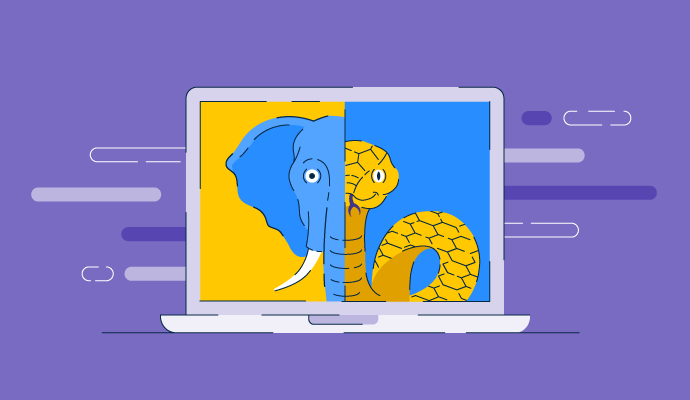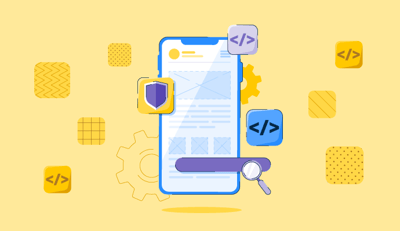April 9, 2024
 by Sagar Joshi / April 9, 2024
by Sagar Joshi / April 9, 2024

PHP and Python help companies build various digital products. Choosing the right one depends on your needs, your application development platform, and the kind of security, flexibility, or versatility you expect.
This article will help you compare PHP vs. Python in multiple scenarios so you can confidently choose the programming language that best fits your purpose.
Developers generally prefer Hypertext Preprocessor (PHP) for web application development. Python caters to broader functions like web and application development, artificial intelligence (AI), machine learning (ML), and data analytics.
Let's explore how they differ.
Before we get too deep into our breakdown, below are brief descriptions of each.
PHP is a server-side programming language that has evolved with many updates and features over the years to cater to a large community of web developers. Present-day PHP is fast, safe, and efficient. Its just-in-time (JIT) compilation feature has expedited running code.
PHP is a go-to option for web developers who want to create websites. It integrates with other web technologies, databases, front-end technologies, and content management systems to deliver fancy, yet easy-to-navigate, web apps.
Python is a simple-to-understand programming language with several tools and libraries available to its community. You can use it to create websites, aid machine learning (ML) models, or automate tasks and processes. It has tools like Flask, Pyramid, or Django that make web development easy for programmers.
Like Pandas or Scikit-learn, its libraries concentrate on data science and machine learning applications. Python tops the charts when it co mes to versatility and user interface.
It’s not like PHP and Python are poles apart. A few similarities might interest you as you consider the two options.
There’s some overlap between PHP and Python, but their differences help developers choose the right language for specific use cases.
Rasmus Lerdorf, a Danish-Canadian programmer, introduced PHP in 1994. Back then, it stood for “personal home page,” an open-source programming language. To this day, anyone can download PHP for free, and it’s pretty easy to learn if you know C language.
PHP works with any computer and integrates with other web tech like extensible markup language (XML), JavaScript, or hypertext markup language (HTML). You can easily connect them to the Oracle database and make queries using MYSQL or other options.
Developers prefer PHP over active server pages network-enabled technologies (ASP.NET), Java server pages (JSP), or practical extraction and reporting Language (PERL) because it’s faster.
Developers create dynamic, interactive websites and web apps. The sites react to users' actions. Almost 76.5% of websites, including big ones like Zoom, Facebook, and Microsoft, use PHP.
Hypertext preprocessors not only aid website development, but also let developers create RESTful application programming interfaces (APIs) and simple object access protocol (SOAP) web services through which different software can communicate with each other over the Internet.
Below are some notable features of the PHP programming language.
Created by a Dutch programmer, Guido van Rossum, Python first came out in 1991, and became a favorite among programmers and big tech companies. Python made it easier to create websites with frameworks like Django, Flask, and Web2Py.
Python helps data scientists analyze volumes of data using libraries. It solves problems with its many tools and a strong community to assist when needed. Python is a language that people from all over the world have helped make better.
Compared to other languages like C++ or Java, Python is free to use and easier to learn. While coding with Python, you can write the code in the Windows operating system and later move it to another system like Mac or Linux. It works the same way in other operating systems as it does in the OS where the code is written.
The code runs line by line to easily identify and fix issues. You can mix Python with C++ code and compile it to get the outcomes you expect.
Developers love using Python because of its flexibility and ease. It uses Django and Flask so developers can build web apps faster with less coding. They also find it easier to sort, process, and visualize data using Python libraries.
On the AI and ML side, Python offers libraries like TensorFlow and Kera that deliver ready-to-use artificial intelligence and machine learning tools. It does a great job of automating tasks with scripts to save on time. It has a Pygame library for gaming use cases that lets programmers create fun 2D games while it takes good care of visuals, sounds, and mechanics. Lastly, the programming language supports creating desktop apps with multiple operating systems using thePyQT and wxPython frameworks.
Below are some of Python’s notable features.
Let’s compare PHP and Python according to programmers' everyday needs to help you arrive at a final verdict.
In the above section, PHP comes ahead of Python by three points. However, this doesn’t automatically mean you should choose Python. They’re both reliable choices for developing websites and applications.
Your choice depends on your work, your experience, and your expertise. A seasoned programmer can go with either PHP or Python when they’re looking to create a simple website.
But starting with Python is a better option if you're a beginner, as it’s easier to learn. From there, you can explore PHP and other languages to upskill yourself. Moreover, choosing Python is smart if you aspire to work with AI, ML, or Big Data.
Learn more about different app programming languages to develop your next product stack.
Sagar Joshi is a former content marketing specialist at G2 in India. He is an engineer with a keen interest in data analytics and cybersecurity. He writes about topics related to them. You can find him reading books, learning a new language, or playing pool in his free time.
Servers handle the requests your browser makes while you’re online. Two types of servers...
 by Sagar Joshi
by Sagar Joshi
It just might be the holy grail of programming languages.
 by Bridget Poetker
by Bridget Poetker
Seeing the current face of technology, Charles Babbage would be over the moon.
 by Bridget Poetker
by Bridget Poetker
Servers handle the requests your browser makes while you’re online. Two types of servers...
 by Sagar Joshi
by Sagar Joshi
It just might be the holy grail of programming languages.
 by Bridget Poetker
by Bridget Poetker


